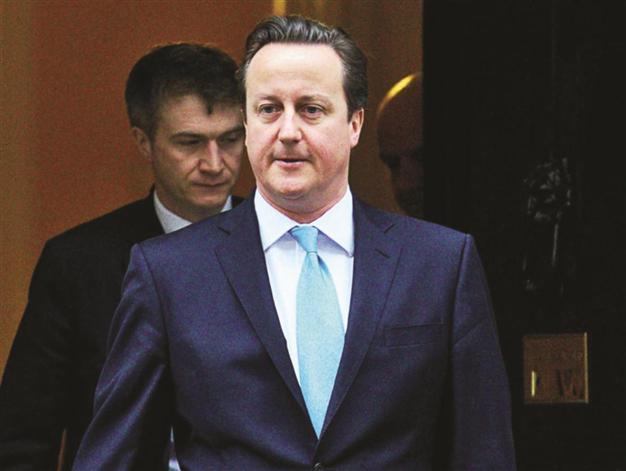Not referendum but EU revision, says UK
LONDON

British Prime Minister David Cameron speaks at a media conference after an EU summit in Brussels. ‘I don’t think it’s in our interests to leave the European Union,’ Cameron tells BCC.
British Prime Minister David Cameron yesterday played down the prospect of a referendum anytime soon on whether Britain should leave the European Union, while seeking a revision in relations with the union.Cameron is expected to explain how he wants to change Britain’s relationship with the EU next week, in a speech that could set a course for leaving the 27-member bloc, deepen fractures within his own party and strain ties with his Liberal Democrat coalition partners.
A weekend poll by influential website ConservativeHome found that 78 percent of Conservative Party members either want Britain’s relationship with the EU reduced to access to its common market or to leave the bloc altogether.
“If we had an in-out referendum tomorrow, or very shortly, I don’t think that would be the right answer for the simple reason that I think we would be giving people a false choice,” Cameron told BBC radio.
“Right now I think there are a lot of people who say ‘I would like to be in Europe, but I’m not happy with every aspect of the relationship, so I want it changed.’ That is my view.”
Conservative infighting over Europe helped topple previous party leaders and splits on the issue appear to be deepening as Cameron’s speech nears. Media reports say he will speak on Jan. 22 or 23 in Germany or in the Netherlands. Cameron’s office declined to confirm the reports.Communities Secretary Eric Pickles, a Conservative, said on Jan. 13 he hoped it was in Britain’s interest to stay in the EU, but “we shouldn’t stay at any price.”
‘UK to remain in EU’
Cameron says he wants Britain to remain in the EU - a major trading partner - but is under pressure from an increasingly euroskeptic public to repatriate powers from Brussels or leave the bloc altogether.
“I don’t think it’s in our interests to leave the European Union,” he told the BBC. “Would Britain collapse if we left the European Union? No, of course not. We could choose a different path. The question is, what is in our national interest?” However, he said he was “not happy” with the relationship and said the British public was also “increasingly fed up that they’ve been left out of this debate.” He said he wanted a “fresh settlement, and then fresh consent for that settlement.”
“I’m optimistic and confident that we can achieve changes in the European Union to make sure that Britain feels more comfortable with our relationship with Europe,” he said.
Both pro and anti-Europe senior politicians stepped up their campaigns, with the euroskeptic Conservative group “Fresh Start” pledging to demand a radical repatriation of powers from Brussels this week.
On the other side of the debate, Conservative Party grandee Michael Heseltine said on Jan. 12 Cameron’s plan to change Britain’s relationship with the EU was an “unnecessary gamble,” and put the country’s status as a business destination at risk.
Compiled from AFP and Reuters stories by the Daily News staff.
















